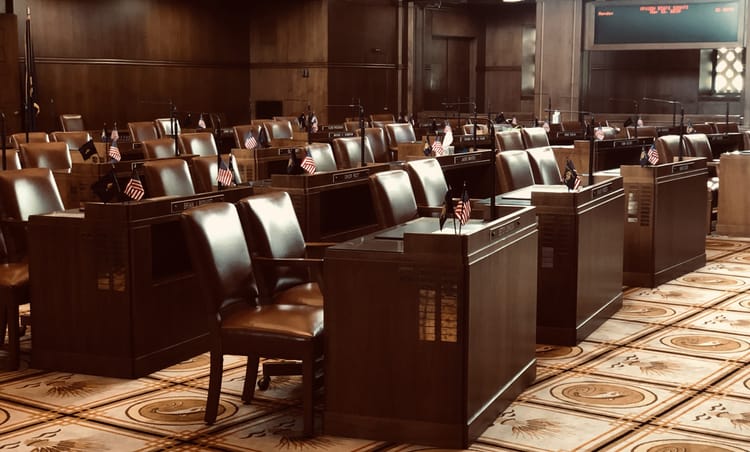A Different Type of Chips

The Takeaway
In some ways, this legislative session is a different environment than the ones we are accustomed to experiencing. Democrats are going out of their way to hold hearings on Republican bills that, in any other session, would not even receive lip service. Republicans are working with Democrats on some of their top priorities, seemingly without preconditions. This session is not an episode of The Twilight Zone, as much as it may seem like it.
Lawmakers have spent a lot of time talking about semiconductors, but there is another category of chips at play this session—bargaining chips.
If the legislature is to balance the budget without painful cuts to government services and programs, Democrats will need to curry enough Republican votes to draw out money from the state’s reserve account or raise taxes. Republicans know their support is crucial to a successful session and seek ways to create leverage to influence the session’s trajectory and advance their own priorities.
Although temperaments are calmer than in previous sessions, Republicans still insist the legislature must read the entirety of a bill before its final vote. It’s easy to overlook, but there are only 21 lawmakers who served prior to these bill readings becoming commonplace. Before the 2016 session, the legislature regularly waived the constitutional requirement on its first day and the procedural slowdown was not even in the toolkit of parliamentary tactics. Then, during the 2016 session, with several high-profile and controversial measures poised for the short 35-day session, Republican chiefs of staff devised a strategy to demand bill readings, driving the pace of the session to a halt and creating valuable leverage over the session.
For anyone nerdy enough, like me, here is the fateful moment that changed the legislature as recorded in the House Journal on February 1, 2016:
Williamson moved that, in compliance with Article IV, Section 19 of the Oregon Constitution, and notwithstanding any provision of the Rules of the House of Representatives, the requirement that on its final passage each bill shall be read section by section be suspended for the duration of the 2016 Regular Session of the Seventy-eighth Legislative Assembly, and that all bills pending before the House for final passage during the Regular Session be read by title only.
McLane called for Division on the motion.
On adoption of the motion the vote was: Yeas, 36; Nays, 22 – Barreto, Bentz, Buehler, Davis, Esquivel, Gilliam, Hack, Hayden, Heard, Huffman, Johnson, Kennemer, McLane, Nearman, Post, Smith, Sprenger, Stark, Weidner, Whisnant, Whitsett, Wilson; Excused, 2 – Krieger, Olson. Motion failed.
House adjourned until 10:30 a.m. Wednesday, February 3, 2016 on motion of Barnhart.
The legislature is never without some form of controversy and the practice quickly became a staple of the minority party. For most lawmakers today, they know no other world.
Funding Oregon’s Schools and the Corporate Kicker
The state budget for public education is always one of the legislature’s most delicate dances where nobody seems particularly pleased with the result. That is already the case for the 2023 session, with the governor, legislature, and education advocates disagreeing over the amount needed to fully fund public schools to the tune of billions of dollars.
Adding another wrinkle in the debate over school funding is a dispute over how the legislature allocates the corporate income tax kicker. In 2012, the legislature referred a constitutional amendment to voters dedicating the corporate kicker to additional funding for kindergarten through high school programs. While implementing the constitutional provision into statute, the legislature directed the funds to the primary budget for schools. In practice, advocates say the statutory policy regularly results in the legislature not meeting the intent of the voters in providing additional funding but, instead, using the corporate kicker to offset money it would otherwise dedicate to education. In its latest report, Oregon’s Quality Education Commission recommended the state conduct a legal review and audit of the legislature’s practice to see if it complied with the constitutional intent.
Legislation under consideration this session, SB 521, seeks to get ahead of that controversy by aligning statutory practice to the constitutional intent, directing episodic money to one-time spending, like school construction and infrastructure projects. According to some analysts, however, the measure’s effect could deepen the disputed budget targets for funding school teachers, administration, and general operations. Oregon’s corporate kicker is not chump change this year. State economists project the largest corporate kicker in the state’s history at $1.4 billion. If the legislature directs this money away from the classrooms, it could create an artificial need for more revenue and deepen the looming pressure over a challenging state budget negotiation.

What We're Reading This Week
- Oregon Capital Chronicle writes about the diverging positions between state and education leaders over funding public schools.
- Oregon’s state economist provides some insights into workforce trends, suggesting the state needs to create more employment opportunities for residents and draw more people from elsewhere.
- On Friday, Oregon’s Environmental Quality Commission unanimously selected the next director of the Department of Environmental Quality, overseeing many of the state’s most contentious programs, including climate and recycling.
- Dick Hughes, a longtime capital reporter, dedicated his weekly column to Gov. Tina Kotek (D) drawing on the experience of the late Gov. Vic Atiyeh (R) to guide her leadership style.
- The Wall Street Journal published an analysis of state fiscal positions as the economy faces considerable headwinds. The report suggests that states learned their lessons from the Great Recession and saved for a rainy day, potentially softening painful cuts to government programs.





